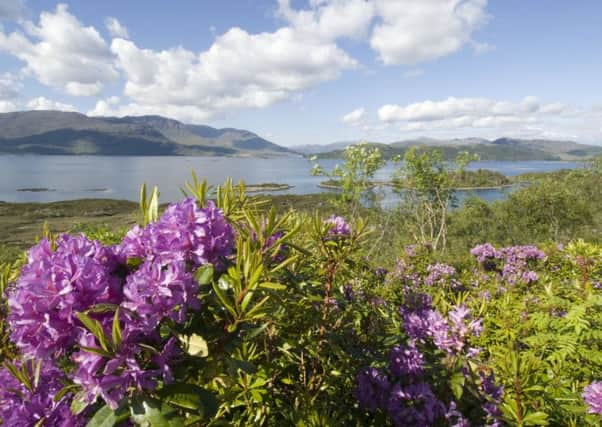Plant swap to rid Highland beauty spot of invasive species


Botanical experts from National Trust for Scotland (NTS) are offering ‘plant swaps’ to local residents as a way of completely eradicating non-native Rhododendron ponticum from a Wester Ross estate.
They will give householders alternative rhododendrons varieties that pose no threat to the native habitat and even carry out removal and replacement work in an effort to stop seeds spreading to hillsides around Torridon from neighbouring gardens.
Advertisement
Hide AdAdvertisement
Hide AdThe rhododendrons are native to southern Europe and south-west Asia but were introduced to the UK in the 1700s.
A favourite of Victorian plant-hunters, ponticum became a colourful addition to many Scottish estates because of it vibrant pink and purple blooms and use as cover for game birds.
More than a century later, the fast-growing evergreen shrubs have taken over large areas of natural vegetation.
Experts say the plant has become “one of the biggest threats to biodiversity and habitats in western Scotland” because of its ability to thrive in the wet climate and acidic soil.
Clearance strategies have been developed, including the flailing and cutting down of plants and follow-up spraying with weed-killer.
However, injection of herbicide into individual plants has been found to be more precise and effective.
The NTS has been using this method on bushes spreading across mountainsides on the estate.
They say the technique is efficient, particularly on steep scree-clad slopes, and is more environmentally friendly than less targeted weed control.
Advertisement
Hide AdAdvertisement
Hide AdBut conservation workers realised that residential gardens in villages such as Fasag were a last bastion for the plants, and threaten control work through re-seeding sites that have been cleared.
The NTS has identified suitable non-invasive rhododendron cultivars, such as Lord Roberts and Cunningham’s White, and offered to swap these with the offending ponticum.
The trust will also provide workers to carry out the task.
Rob Dewar, nature conservation advisor for NTS, is optimistic that removing this last domestic source of seeding will help efforts to restore the area’s natural wilderness.
“If left long enough, Rhododendron ponticum shuts out all the light coming in to ground, so nothing can grow and we lose that diversity,” Rob Dewar said.
“They prevent access, have no use for grazing and destroy native habitat, and if left they just keep spreading – they are a problem that we need to tackle.
“We have already removed most of the Rhododendron ponticum from the open ground on the Torridon estate, but it’s the remaining seed source which is the problem now, in and around people’s properties.”
He added: “We are offering to remove the plants from public gardens and replace them with non-invasive cultivars that will grow quite quickly to replace them.
“It’s worth remembering that one single rhododendron plant can send out thousands of seeds and then we have an ongoing control issue.”
Advertisement
Hide AdAdvertisement
Hide AdAnother NTS initiative has seen removed rhododendron wood being used to make ‘eco-charcoal’ at several sites across the Highlands.
Charcoal kilns were once a familiar site in northern Scotland in the 1600s, supplying raw fuel for the iron industry.
The NTS project is on a much smaller scale, producing charcoal for household barbecues.
The Torridon Estate is a magnet for walkers, geologists and naturalists, and includes some of Scotland’s best known mountain scenery.
The estate is part of the Beinn Eighe National Nature Reserve, while five out of the 46 Munros on NTS property can be found at Torridon.
Honey produced with pollen from Rhododendron ponticum flowers can be quite poisonous to humans, causing severe high blood pressure and abnormally slow heartbeat if consumed in sufficient quantities.